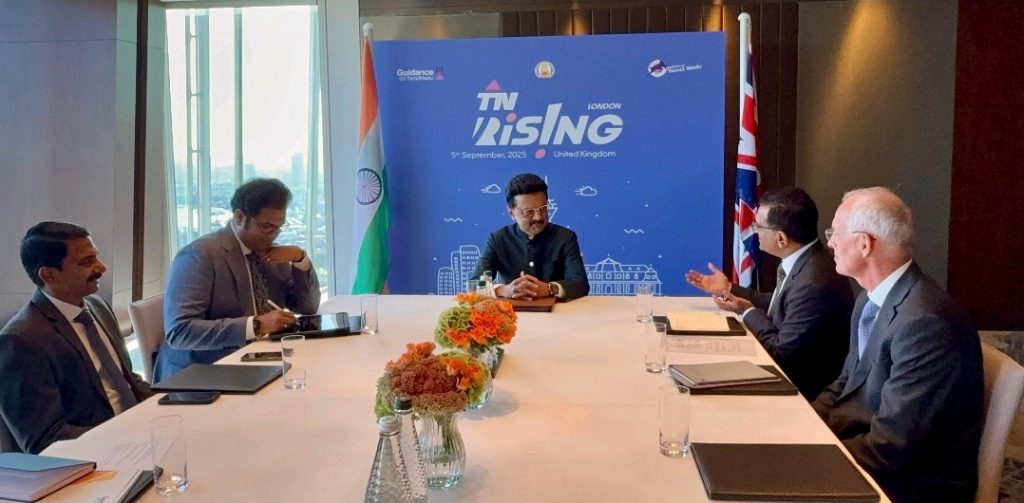AstraZeneca Rs 176 Crore Investment Signals a Customer Experience Revolution in Indian Healthcare
The pharmaceutical industry is witnessing unprecedented change. Moreover, companies are recognizing that exceptional customer experience (CX) drives business success beyond traditional metrics. Furthermore, AstraZeneca latest Rs 176 crore investment in Chennai exemplifies this transformation.
AstraZeneca: The Strategic Investment That’s Reshaping Healthcare CX
AstraZeneca announced its third significant investment in India within two years on September 6, 2025. Additionally, this Rs 176 crore commitment focuses on expanding the Global Innovation & Technology Centre (GITC) in Chennai. Consequently, the investment represents more than infrastructure expansion – it signals a fundamental shift toward customer-centric healthcare delivery.
The announcement coincided with Tamil Nadu Chief Minister MK Stalin’s UK visit. Furthermore, this timing underscores the strategic importance of India’s role in global pharmaceutical innovation. Additionally, the investment builds on AstraZeneca’s 45-year presence in India.
AstraZeneca Customer Experience: The New Prescription for Pharmaceutical Success
Research reveals that customer experience drives 35% of healthcare professionals’ prescription decisions. Moreover, excellent CX doubles the likelihood that healthcare providers will prescribe a company’s products. Consequently, pharmaceutical companies are transforming their engagement strategies.
AstraZeneca investment directly addresses this reality. Additionally, the expanded GITC will house specialists in artificial intelligence, data analytics, and machine learning. Furthermore, these technologies enable personalized patient interactions and streamlined healthcare delivery.
The company’s Managing Director, Siva Padmanabhan, emphasized this connection. He stated that the investment reflects their “ongoing mission to improve patient lives by embedding cutting-edge technologies into every aspect of our work”. Therefore, technology becomes the bridge between pharmaceutical innovation and patient experience.
Digital Transformation Driving Patient-Centric Care
India’s digital healthcare market demonstrates explosive growth potential. Specifically, the sector is projected to expand from $2.7 billion in 2022 to $37 billion by 2030. Consequently, pharmaceutical companies are investing heavily in digital patient engagement platforms.
AstraZeneca’s global digital transformation strategy exemplifies this trend. The company previously launched PfizerForAll-style platforms to connect patients with healthcare professionals. Similarly, the Chennai expansion will accelerate development of AI-powered healthcare solutions.
Digital tools are revolutionizing patient engagement across multiple touchpoints. For instance, AI-powered chatbots provide 24/7 patient support and medication guidance. Additionally, personalized health insights help patients manage chronic conditions more effectively.
The pharmaceutical industry recognizes that patient-centric approaches build stronger brand loyalty. Research shows that 74% of healthcare professionals gain confidence in products when companies provide excellent customer experiences. Therefore, digital transformation becomes essential for competitive advantage.
AI and Machine Learning: Transforming Healthcare Interactions
AstraZeneca’s investment prioritizes artificial intelligence and machine learning capabilities. These technologies enable pharmaceutical companies to predict patient needs and personalize treatment recommendations. Furthermore, AI streamlines clinical trial processes and accelerates drug development timelines.
The Chennai GITC expansion will accommodate 1,300 new employees focused on advanced technologies. Additionally, these specialists will develop solutions for global therapeutic areas and clinical research applications. Consequently, the center becomes a hub for healthcare innovation.
Machine learning applications in healthcare deliver measurable benefits. For example, AI algorithms analyze medical imaging with greater accuracy than human radiologists. Moreover, predictive analytics help identify patients at risk of adverse events before they occur.
AstraZeneca’s approach integrates these technologies into every aspect of patient care. The company uses AI to optimize supply chain management and improve medication accessibility. Additionally, machine learning enhances clinical trial efficiency and patient matching processes.
Global Capability Centers: India’s Role in Healthcare Innovation
India has emerged as a global hub for pharmaceutical innovation through Global Capability Centers (GCCs). Currently, 23 of the world’s top 50 life sciences companies operate centers in India. Moreover, these facilities handle 70% of global finance operations and 75% of HR functions for their parent companies.
The concentration of healthcare GCCs in major Indian cities creates innovation ecosystems. Bengaluru leads with 33% of total centers, followed by Hyderabad and Mumbai. Furthermore, approximately 85% of healthcare-related GCCs operate in these four metropolitan areas.
AstraZeneca’s dual-center strategy leverages this ecosystem effectively. The Chennai GITC focuses on IT and global business services, while Bengaluru emphasizes research and development. Consequently, the company optimizes different capabilities across strategic locations.
These centers drive significant value creation beyond cost savings. Modern GCCs manage drug discovery, regulatory affairs, and commercial operations. Additionally, they contribute to global mandates including digital therapeutics and real-world evidence analytics.
Personalization: The Future of Pharmaceutical Customer Experience
Personalized healthcare represents the next frontier in patient engagement. Pharmaceutical companies increasingly tailor communications to individual patient needs and medical histories. Furthermore, this approach fosters stronger relationships between patients and healthcare providers.
AstraZeneca’s technology investments enable sophisticated personalization capabilities. The company analyzes vast patient datasets to identify patterns and predict health risks. Additionally, AI algorithms recommend personalized treatment options based on genetic and lifestyle factors.
Interactive patient programs are revolutionizing healthcare education. These platforms provide personalized health insights and medication management tools. Moreover, patients who feel understood and valued demonstrate higher brand loyalty and treatment adherence.
The shift toward personalized content significantly impacts patient trust. Research indicates that customized communications increase patient engagement and satisfaction. Therefore, pharmaceutical companies must invest in technologies that enable meaningful personalization.
Supply Chain Analytics: Ensuring Medication Accessibility
AstraZeneca’s investment includes significant focus on supply chain analytics capabilities. The expanded Chennai center will optimize global supply chain management and external supplier relationships. Consequently, patients experience improved medication accessibility and reduced shortages.
Advanced analytics enable pharmaceutical companies to predict demand fluctuations and optimize inventory management. Additionally, AI-powered systems identify potential supply chain disruptions before they impact patient care. Furthermore, these capabilities become increasingly critical in global healthcare delivery.
The company’s supply chain innovation extends beyond traditional logistics. AstraZeneca integrates IoT sensors and real-time monitoring to ensure medication quality throughout distribution. Moreover, these technologies provide transparency and traceability for regulatory compliance.
Digital supply chain solutions directly impact customer experience. Patients receive more reliable access to medications, while healthcare providers gain visibility into product availability. Therefore, supply chain excellence becomes a competitive differentiator in pharmaceutical markets.
Clinical Trials: Accelerating Innovation Through Technology
AstraZeneca’s expanded Indian operations will significantly enhance global clinical trial capabilities. The centers support clinical research across all therapeutic areas, including oncology, cardiovascular, and rare diseases. Furthermore, advanced technologies streamline patient recruitment and data analysis processes.
AI applications in clinical trials deliver substantial efficiency improvements. Machine learning algorithms identify suitable patients for specific studies, reducing recruitment timelines. Additionally, automated data analysis accelerates the path from research to regulatory approval.
The Chennai and Bengaluru centers will leverage India’s diverse patient population for clinical research. This diversity enables more comprehensive testing of new medications across different genetic backgrounds. Consequently, pharmaceutical companies develop more effective treatments for global markets.
Digital clinical trial platforms enhance patient participation and retention. Mobile applications allow participants to report symptoms and side effects remotely. Moreover, these tools reduce the burden of study participation while maintaining data quality.
Regulatory Compliance: Technology Enabling Trust
Pharmaceutical customer experience must balance innovation with regulatory compliance. AstraZeneca’s technology investments include robust systems for pharmacovigilance and regulatory reporting. Additionally, these capabilities ensure patient safety while enabling personalized healthcare delivery.
AI-powered compliance systems automatically monitor adverse events and drug interactions. These technologies analyze vast datasets to identify potential safety signals before they become widespread issues. Furthermore, automated reporting ensures timely communication with regulatory authorities.
The company’s Indian centers contribute significantly to global regulatory affairs. Teams in Chennai and Bengaluru support regulatory submissions and maintenance across multiple markets. Consequently, AstraZeneca maintains compliance while accelerating market access for new medications.
Regulatory technology investments directly benefit customer experience. Patients receive safer medications with better safety monitoring throughout treatment. Moreover, streamlined approval processes enable faster access to innovative therapies.
Building Trust Through Transparent Communication
Customer experience in pharmaceuticals fundamentally depends on trust and credibility. AstraZeneca’s technology investments enable more transparent and timely communication with patients and healthcare providers. Additionally, digital platforms facilitate proactive sharing of safety information and treatment guidance.
The company’s website optimization efforts demonstrate commitment to user experience. AstraZeneca uses advanced analytics to understand how different audiences engage with content. Furthermore, this data drives improvements in website design and information accessibility.
Healthcare professionals particularly value relevant, timely clinical information. AstraZeneca’s expanded capabilities will deliver personalized content based on specialty and patient populations. Consequently, healthcare providers receive information that directly supports their practice needs.
Patient education platforms represent another trust-building opportunity. The company develops interactive tools that help patients understand their conditions and treatment options. Moreover, these resources empower patients to make informed decisions about their healthcare.

The Economic Impact of Customer-Centric Healthcare
AstraZeneca’s investment reflects broader economic trends in Indian healthcare technology. The digital health sector’s projected growth to $37 billion by 2030 creates substantial opportunities. Furthermore, customer-focused companies are positioned to capture disproportionate value in this expanding market.
The company’s Indian operations now employ over 5,000 people across multiple locations. Additionally, the planned expansions will create approximately 2,200 new jobs in Chennai and Bengaluru. Therefore, customer experience investments drive both innovation and employment growth.
Tamil Nadu Chief Minister MK Stalin highlighted the investment’s broader significance. He emphasized that AstraZeneca’s commitment demonstrates the state’s reputation as “a centre of excellence for global innovation”. Consequently, customer experience excellence attracts continued international investment.
The multiplier effects of pharmaceutical CX investments extend throughout the healthcare ecosystem. Improved patient outcomes reduce overall healthcare costs while increasing satisfaction. Additionally, efficient supply chains and clinical trials accelerate access to innovative treatments.
Looking Forward: The Customer Experience Imperative
AstraZeneca’s Rs 176 crore investment represents more than facility expansion – it signals the pharmaceutical industry’s evolution toward customer-centricity. Companies that prioritize exceptional customer experiences will differentiate themselves in increasingly competitive markets.
The integration of artificial intelligence, machine learning, and advanced analytics enables unprecedented personalization in healthcare delivery. Furthermore, these technologies transform every aspect of the patient journey, from initial awareness through ongoing treatment management.
India’s role as a global pharmaceutical innovation hub continues strengthening. The country’s talented workforce, supportive policies, and advanced infrastructure create ideal conditions for customer experience excellence. Moreover, companies like AstraZeneca leverage these advantages to serve patients worldwide.
The future of pharmaceutical customer experience lies in seamless integration of technology and human-centered care. AstraZeneca’s investment demonstrates how companies can use digital transformation to enhance rather than replace personal healthcare relationships. Consequently, patients receive both advanced medical treatments and compassionate, personalized support.
As the pharmaceutical industry continues evolving, customer experience will increasingly determine competitive success. Companies that invest in understanding and serving patient needs will build sustainable competitive advantages. Therefore, AstraZeneca’s strategic investment in Chennai represents both present opportunity and future necessity in healthcare innovation.

